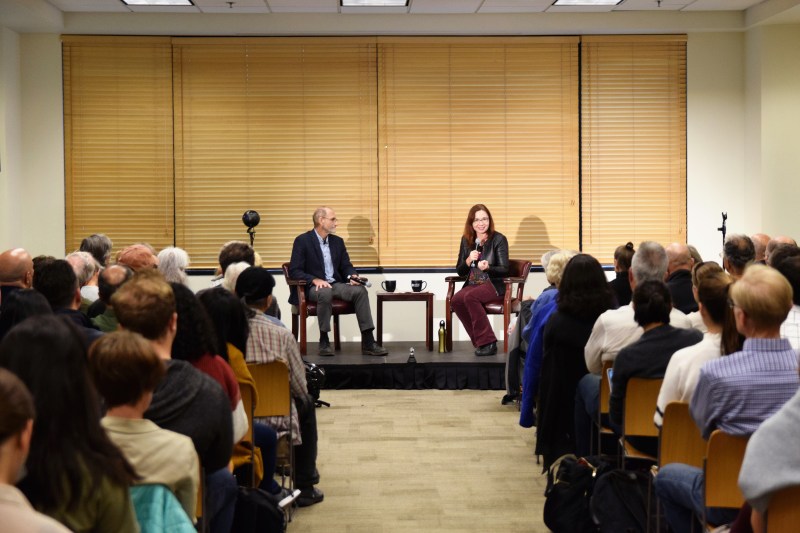This is the fourth article in a series The Daily is publishing about climate change, environmentalism and sustainability on and off campus.
“My philosophy is this: Just about every single person on this planet already cares about a changing climate — they just haven’t connected the dots,” said climate scientist Katharine Hayhoe to an audience at the Arrillaga Alumni Center on Thursday. She was joined by Stanford Woods Institute for the Environment Director Chris Field in a discussion on science communication and climate change awareness.
Hayhoe, a political science professor at Texas Tech University, works with companies, communities of faith, individuals and local and national governments. If she can’t find a way to connect to the people she’s talking with, she said, she won’t talk to them at all.
“My one rule is this,” Hayhoe said. “If I can’t figure out a way to truly connect with, appreciate and share the values of that group, I don’t think I should be there.”
To that end, she focuses on finding common ground with her clients. When she consulted an oil and gas company, for example, she began the meeting by expressing her gratefulness for fossil fuels. Company members were more open to speaking with her when she found common ground, Hayhoe said.
With governments, Hayhoe has had more trouble. Many countries resist climate action because they don’t see themselves as the main perpetrators of the problem.
“Something interesting that I’ve noticed is that I hear the same argument in every country,” Hayhoe said. “Everybody says that they’re not the problem. That’s why climate change is so hard to fix — everybody points the finger at someone else.”
Field, too, mentioned that there is a difficulty in achieving fairness in climate responses. He proposed how different countries should respond.
“Ultimately, the only fair thing to end up on is equal emissions per capita — because otherwise, we’re saying that a human is valued differently depending on where they are,” Hayhoe said. “But then you could say, ‘I live in a place that’s a nice temperate climate so I don’t need a lot of heating or air conditioning and then this person lives in Alaska and they do need a lot of heating.’”
As a solution, Hayhoe proposed her idea of a “potluck approach,” where, instead of having a baseline set of rules that all countries have to follow, every country comes up with its own contributions.
The conversation shifted into the concrete actions that can be taken to make a change. On a smaller scale, Hayhoe suggests that individuals should make efforts to understand their carbon emissions and how to reduce them. At the same time, she acknowledged that individual change often feels unsatisfactory and that there is also a need for a systemwide change.
In response, Field discussed his concern with what people see as effective options — specifically, the “magic wand solution.”
“[The magic wand solution is the idea] that we will be able to activate large amounts of negative emissions in the latter half of the century and that that somehow provides a license to continue high emissions today,” Field said. “There are many historical epics where this kind of technology optimism has dug us into a hole.”
During the question-and-answer portion, one audience member asked why Hayhoe didn’t discuss the problem of overpopulation, claiming that many millennials are choosing not to have children because of the impact the growing population has on the planet.
“If you look at who produces the emissions, 10% of the world produces 50% of the emissions,” Hayhoe responded. “So it’s not a case of overpopulation per se; it’s a case of the unequal allocation of resources.”
Event attendee Courtney Payne, a third-year Ph.D. student in the Earth Systems department, said she is concerned with how the overpopulation problem is often addressed from a population control standpoint.
“One thing is that often overpopulation is a racist idea,” she said. “I am not going to have children for climate-related reasons, [but] I think that that’s something everyone should be able to decide for themselves.”
Field said that spreading awareness of climate change can be a slippery slope, even when people are willing to listen.
“One of the things that I think is important in getting the real messages out is avoiding a sense of hopelessness,” he said.
Hayhoe agreed with Field, ending with the message that hope is one of the most important ways we can come together to create a better future.
“I think [we need] rational hope — not false hope or false solutions or the idea that one solution will save us all — but a rational hope that acknowledges it is bad and it is getting worse,” she said. “We have to have that hope because without that hope we will have a self-fulfilling prophecy.”
Contact Clara Kieschnick at ckiesch ‘at’ stanford.edu.
